Most people don’t have a good understanding of emotional intelligence, but it is one of the most important skills to develop if you want to be successful in life and business.
It is not always simple to learn how to navigate the numerous setbacks caused by emotional illiteracy, which is probably why you are reading this article right now.
This blog post will cover the basics of what you need to learn to use your emotions effectively.
Let’s begin…
- What Does Emotional Intelligence Really Mean?
- What Is the Difference Between Emotional Intelligence and EQ?
- Where Did the Term “Emotional Intelligence” Originate?
- Why Is Emotional Intelligence so Important?
- The Four Components of Emotional Intelligence
- Use Emotional Intelligence to Work With Others
- Questions You May Have
This page contains affiliate links. This means that if you click a link and buy one of the products on this page, I may receive a commission (at no extra cost to you!)
What Does Emotional Intelligence Really Mean?

Simply put, emotional intelligence is your ability to identify and manage your emotions in the best way possible.
The four components associated with emotional intelligence are self-awareness, self-management, social awareness, and relationship management.
These four emotional skills are vital in all aspects of our lives, whether in work or personal relationships.
What Is the Difference Between Emotional Intelligence and EQ?
Emotional Intelligence is, again, your ability to identify and manage your emotions in the best way possible.
EQ (emotional quotient) is a way to measure your emotional intelligence.
Both are important, but emotional intelligence itself is not a concrete fact or statistic.
It is more of an emotional journey to be made by you, which will give you the emotional intelligence required to succeed in life.
EQ tests are used by employers to find people who are good at working with others.
To make the difference between the two crystal clear, an emotional quotient tests your emotional intelligence level and tells other people the level of emotional intelligence they can expect from you.
Where Did the Term “Emotional Intelligence” Originate?

The term, emotional intelligence, was invented by psychologists Peter Salovey and John D. Mayer in 1990 and was later popularized by the book “Emotional Intelligence: Why it can matter more than IQ” written by Daniel Goleman, a science writer for the New York Times, specializing in brain and behavior research.
Daniel Goleman argued in his book that emotional intelligence was the primary factor for success in both our personal and professional lives.
Why Is Emotional Intelligence so Important?
Emotional intelligence is crucial because it allows people to understand and recognize their own emotions, as well as the emotions of other people.
People who have a broad understanding of emotional intelligence are better equipped to use that information in a way that makes them more successful and likable by others.
The fact is, when you understand emotions, you’ll be able to comprehend why individuals behave the way they do.
Many people lack emotional intelligence because they never learned how to deal with their emotions. They were taught that emotions make them weak, so they spend their lives avoiding emotional situations.
We all have emotional reactions to our environment. However, not everyone understands how they should properly express themselves or control their emotional responses because they were never taught this valuable life skill.
A Few Benefits of Emotional Intelligence Include:
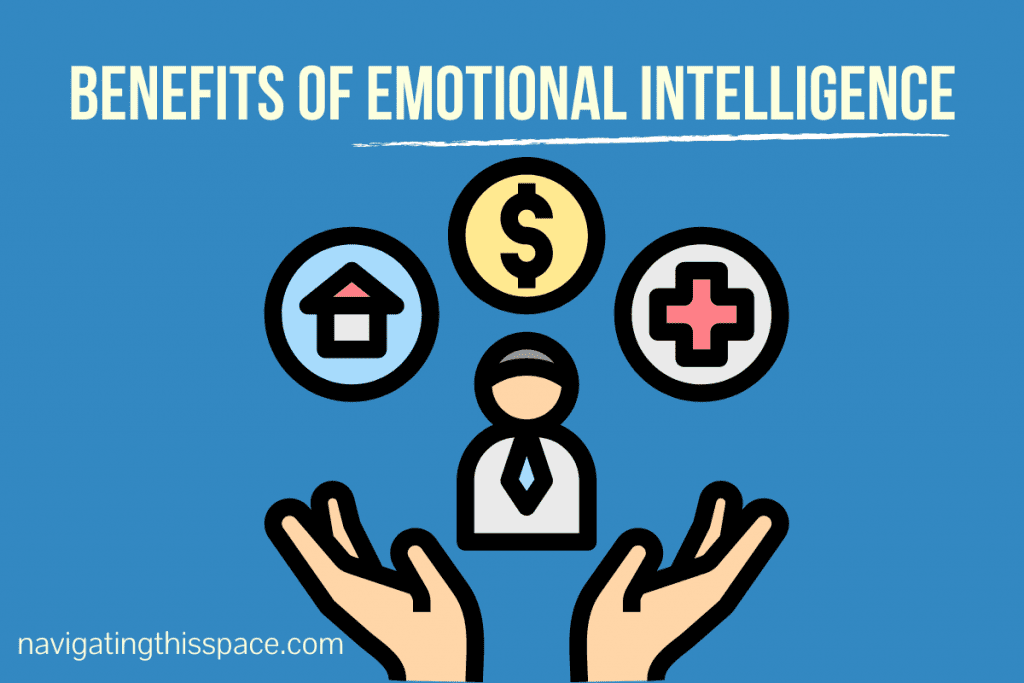
- self-awareness and self-expression
- empathy and compassion for others
- greater connection with your environment and coworkers
- a better understanding of yourself and what makes you happy
- enhanced emotional well-being
- conflict management skills
- the ability to make emotional connections with others
It is a valuable asset that you can develop at any point in your life.
Emotional intelligence isn’t the ability to manipulate people and force change on others.
Using knowledge to manipulate others into doing what you want makes you a predator, not a leader.
Develop emotional intelligence to be a better communicator and a more empathetic individual who recognizes your own emotions, as well as understand what those feelings mean and how they affect you and others. It is not to control people who have a lesser understanding of emotional intelligence.
The Four Components of Emotional Intelligence
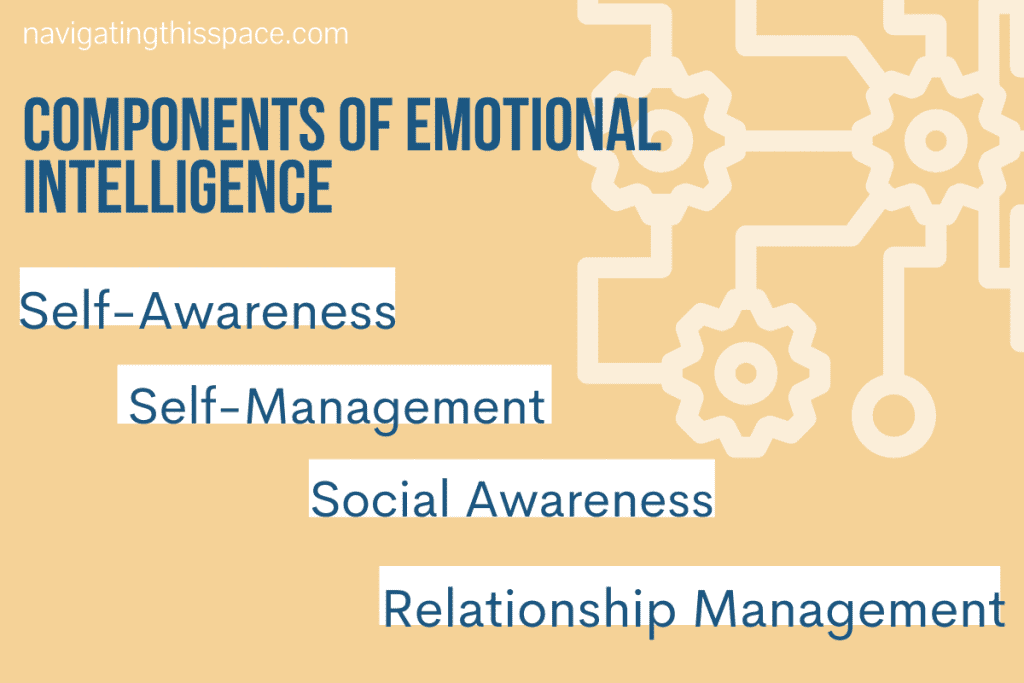
1. Self-Awareness
Self-awareness is about knowing your emotions and what triggers them.
The first step to emotional intelligence is learning how to understand your thoughts, behaviors, and actions without judgment or bias.
Self-awareness is about taking the time to notice the emotions that you are experiencing, as well as understanding why they are happening.
This requires introspection and an understanding of your emotional state.
To be aware of our emotions, we must first take the time to step back and recognize what feelings we are having at a given moment without judging them in any way.
We all have emotions that surface from time to time. However, when these feelings become overwhelming or out of control, it is difficult to control our reactive actions.
To develop your emotional intelligence, you must be aware of your emotional state and not let feelings control your actions, thoughts, or words.
Quick Tips on Improving Your Self-Awareness:
- Spend some time alone each day to reconnect with yourself.
- Practice mindfulness, gratitude, and meditation.
- Keep a journal of your thoughts and feelings.
- Write five things that make you happy or satisfied with yourself each day.
- Take time to do something nice for someone else every day — it will help boost your self-confidence.
- Identify one thing about yourself that you would like to improve, then take the necessary steps towards achieving this goal (e.g., exercise more, eat healthier).
2. Self-Management
The ability to control emotional responses, so they don’t become overwhelming is the gist of self-management.
Emotional intelligence teaches you how to handle your emotional reactions by learning how to recognize your emotions and think about them more healthily.
Self-management also involves recognizing what triggers specific emotional responses and understanding the impact that these emotions have on your work and personal life.
For example:
When someone cuts in front of you in traffic, what happens?
You may feel anger or frustration, especially if you’re running late.
What are these feelings telling you about the situation?
They’re mostly telling you that you did not approve of that driver’s actions, and those actions triggered a high emotional response. That’s why your temperature increased.
If you choose to ignore the driver instead of aggressively blowing your horn, then that simply means you have learned how to recognize and handle emotional triggers.
Quick Tips on Improving Your Self-Management:
- Identify and understand what emotional triggers get under your skin — you can learn a lot about yourself by noticing these emotional reactions.
- Make it a point to be aware of what is happening during downtime, such as waiting in a line that doesn’t seem to be moving.
- Check in with yourself throughout the day, and take a few minutes to meditate and focus on your breathing to manage stress and negative emotions.
- Persistently remind yourself that you are in control of your actions, not the opposite.
- Practice self-control by resisting temptations to react to emotional triggers.
- Find someone who can help you stay accountable to yourself and others, such as a friend or family member.
3. Social Awareness
Emotional intelligence is more than just a talent for responding emotionally correct to situations. It also entails recognizing other people’s emotions and understanding them, which is referred to as social awareness.
Social awareness involves assessing others’ emotions and recognizing how they are impacted by different situations.
This awareness goes beyond empathy, where you feel for another person, to an understanding that comes from taking someone else’s perspective.
Being socially aware means having a better understanding of how your actions affect people around you — whether it be at work or in your personal life.
Quick Tips on Improving Social Awareness:
- Ask at least one person every day about what is important to them (it could be the waiter bringing your food, the cashier at the store, etc.).
- Actively listen to what they have to say and be open-minded about their opinions.
- Do not make assumptions based on stereotypes or other preconceived notions.
- Be aware that not everyone has the same experiences as you, especially if you’re not the same gender.
- Do not interrupt when someone’s talking — let them finish first before engaging in conversation with them.
- If you want to change something, don’t tell others how they should feel about it — try instead listening and understanding where they’re coming from.
4. Relationship Management
As humans, our mental health depends on the types of relationships we choose to engage in.
We are born into relationships. However, as we get older, it’s our choice to determine the type of relationships we want to continue building.
Relationship management involves knowing how to interact and communicate with others in a healthy way — whether at work, your family life, or your social life. It also requires knowledge of how people behave as individuals and groups. And it is important to know and understand relationship patterns that exist among those people.
If a person, family or friend, tends to seek out and maintain toxic relationships, you should consider distancing yourself from them because it will not benefit you mentally and emotionally to continue associating with that type of environment.
The key is to identify and heed the warning signs when a relationship starts becoming toxic and walking away to maintain your mental health and emotional well-being.
Quick Tips on Improving Relationship Management:
- Communicate in an honest, clear, and direct way so that other people don’t have to guess what you’re attempting to convey.
- Remember that everyone is different and should be treated as such — there isn’t a “one size fits all” mentality to life and people.
- Pay attention to non-verbal communication, such as body language and facial expressions.
- Watch your tone of voice — people can pick up on the emotions you’re feeling by the way you express yourself.
- Respect boundaries.
- Avoid making assumptions about any relationship — ask questions instead of guessing what they are thinking or feeling.
Use Emotional Intelligence to Work With Others

Emotional intelligence is the ability to understand and regulate your emotional response, as well as empathize with others.
It’s a crucial talent for anyone in any industry, from sales to marketing teams.
In this article, we’ve covered some of the basics of emotional intelligence — what it entails, how you can improve your emotional intelligence skills, and how emotional intelligence can affect relationships, both personal and professional.
I hope that learning about the basics of emotional intelligence has proven how beneficial this life skill can be.
Now that you know the basics, try applying emotional intelligence to your everyday life and see how it makes a difference in your personal and professional relationships.
Questions You May Have
What exactly is emotional intelligence?
Simply put, emotional intelligence is your ability to identify and manage your emotions in the best way possible. The four components associated with emotional intelligence are self-awareness, self-management, social awareness, and relationship management.
What are the benefits of emotional intelligence?
self-awareness and self-expression
empathy and compassion for others
greater connection with your environment and coworkers
a better understanding of yourself and what makes you happy
enhanced emotional well-being
Why is emotional intelligence important?
Emotional intelligence is crucial because it allows people to understand and recognize their own emotions, as well as the emotions of other people. People who have a broad understanding of emotional intelligence are better equipped to use that information in a way that makes them more successful and likable by others.
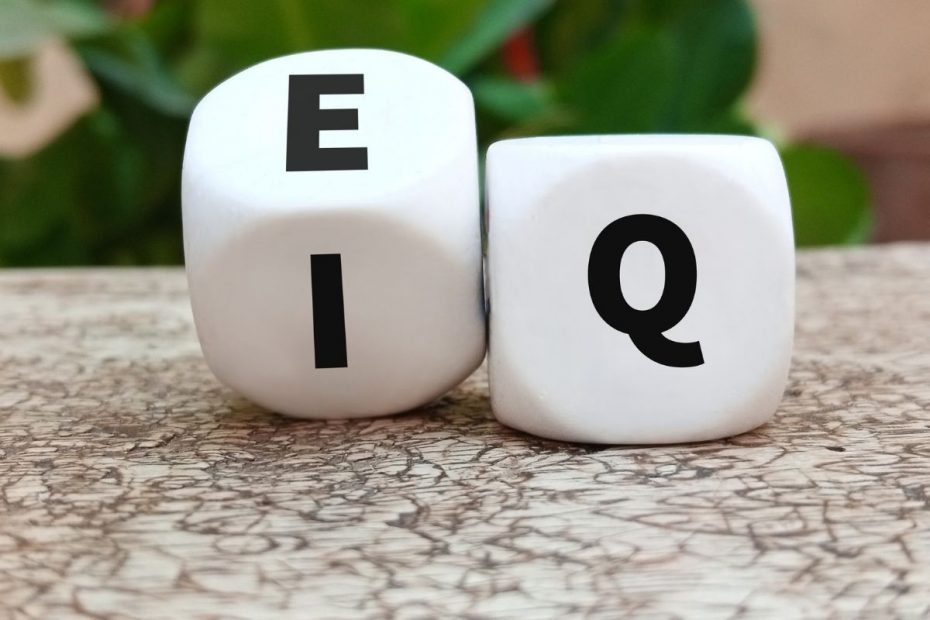

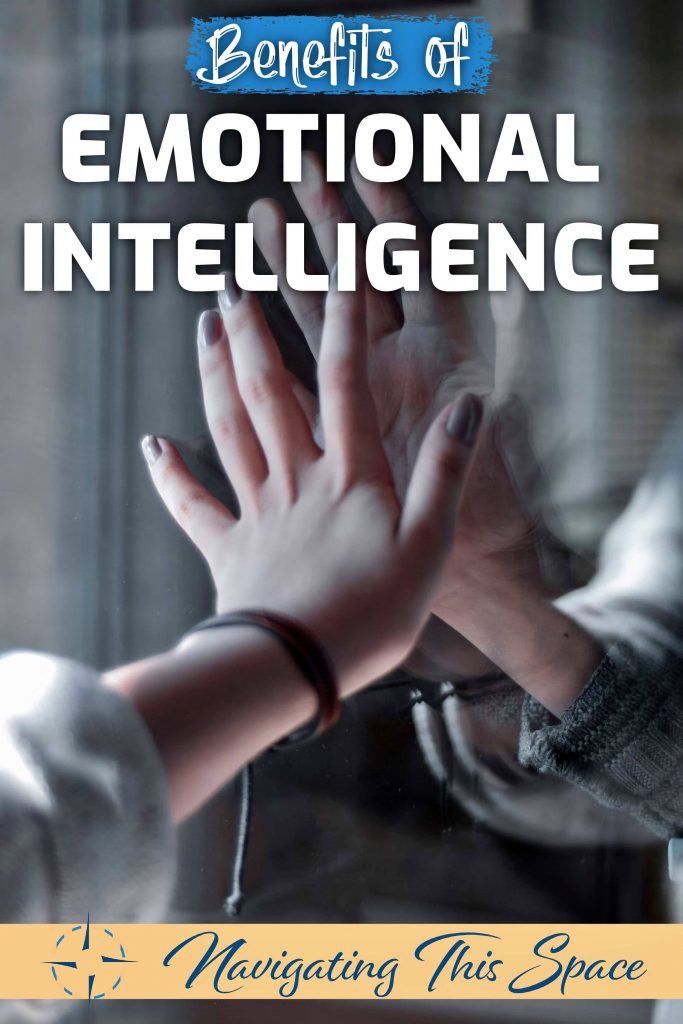
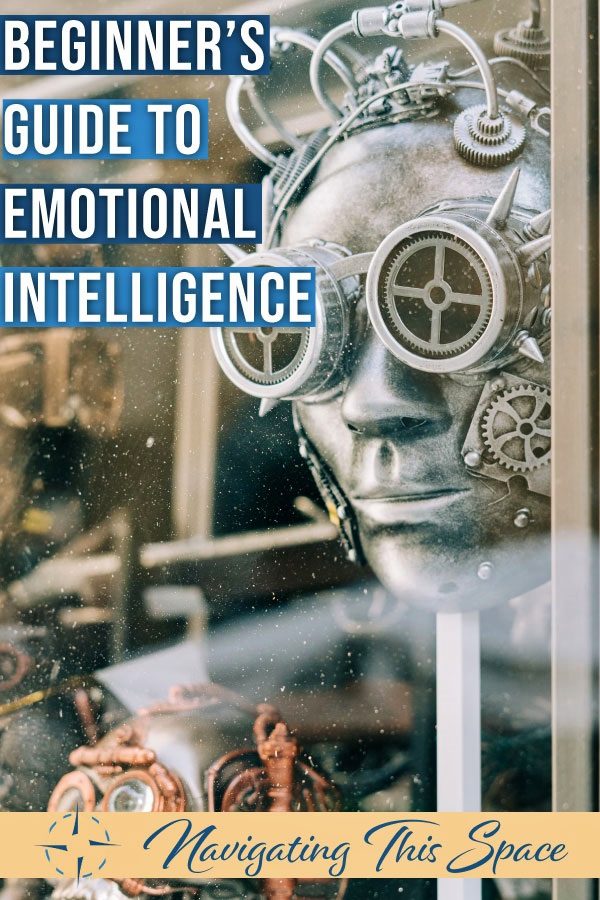



This was a really thorough review of emotional intelligence. As a parent, I’m striving to not only learn more about this, but help my kids with it too.
I applaud you for being eager to learn about emotional intelligence Chelsea, your kids have a great role model. Thanks for reading and commenting, I appreciate it.
This is such an important post for people to read. I have noticed so many people who lack emotional intelligence over the last few years, and I think the isolation and general weirdness of Covid is making it even worse. Having a high EIQ can take you far in life and is one of the most important skills for workers to learn. Great post!
You’re right Katie it’s the most important skill for everyone to learn. Thanks for reading and commenting!
Great beginner’s guide to emotional intelligence! Love how you kept it simple and easy to understand. I like the way you related emotional intelligence to personal and professional aspects. I look forward to reading more articles!